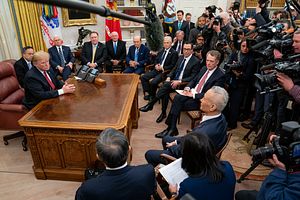Last week, the United States and China wrapped up a new round of high-level trade negotiations in Washington D.C. On January 31, Chinese Vice Premier Liu He, Beijing’s top negotiator in the U.S.-China trade dispute, also had a meeting with U.S. President Donald Trump in the Oval Office.
The White House soon released a formal statement containing rare positive rhetoric. The statement defined the latest negotiation as “intense and productive” and appreciated “the preparation, diligence, and professionalism shown throughout these meetings” by Liu and his team.
In addition, the White House also published the full transcript of the dialogue between Trump and Liu during their meeting.
While the international media paid close attention to the significant moment, not a single piece of news about this meeting has been broadcast by China’s television stations. Neither China’s national TV station, CCTV, nor local TV stations bothered to mention Liu’s meeting with Trump or even the latest U.S.-China trade talks in general.
It’s obvious that China’s top censors have demanded TV stations not to report on the latest development. Instead, the headline of CCTV primetime news on February 1 was about Chinese President Xi Jinping extending “Spring Festival greetings to Beijing residents.”
Notably, China’s digital media, including the internet and mobile platforms, were allowed to recirculate Chinese state news agency Xinhua’s written reports on the U.S.-China trade talks and Liu’s meeting with Trump.
However, compared to the White House’s version, Xinhua’s reports — without any photos — were both vague and brief. Xinhua didn’t specify the issues both sides discussed in the meeting, but generally referred to “the topics of trade balance, technology transfer, protection of intellectual property rights (IPR), non-tariff barriers, the service sector, agriculture, and enforcement mechanisms, as well as certain issues of particular concern for the Chinese side.”
On Liu’s meeting with Trump, Xinhua’s version was even more general, without detailing any dialogue at all. For example, according to the White House statement and other reports, Trump, flanked by U.S. senior officials including Vice President Mike Pence, Trade Representative Robert Lighthizer, and Commerce Secretary Wilbur Ross, proclaimed Liu “a friend of mine” and “one of the most respected men” in the world. Xinhua didn’t mention this.
Most importantly, Xinhua completely omitted any mention that Liu offered to buy “five million tons of soybeans” from the United States, which was a major point of emphasis for the United States. Xinhua also obviously toned down Xi’s flattery in his letter to Trump.
According to the White House transcript, Trump had the letter read aloud during his meeting with Liu. In the letter, Xi said:
As I often say, I feel we have known each other for a long time, ever since we first met. I cherish the good working relations and personal friendship with you. I enjoy our meetings and phone calls in which we could talk about anything. It falls to us to work together and accomplish things meaningful for the people of our two countries and the world at large.
None of those sentiments were mentioned by Xinhua.
As The Diplomat noted earlier, China has every reason to strike a deal with the United States now, considering that Beijing is surrounded by domestic challenges and troubles. However, to its domestic audience — particularly to those passionate nationalists that the Chinese government itself has been cultivating for years — Beijing can’t lose face against Washington. Thus, playing down the trade talks seems to be the only resolution for China’s censors.
Ironically, though, soon after the White House released the information on Liu’s meeting with Trump, various translated versions were widely circulated on China’s social media.
For China’s censors, it’s getting increasingly hard to balance reality and nationalism and control the free flow of information.

































